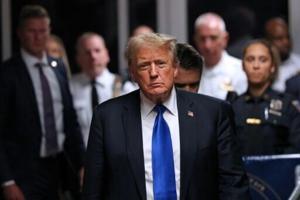
Donald Trump became the first former US president to be convicted of a crime on Thursday after a New York jury found him guilty on all charges in the hush-money case, potentially putting him back in the White House with just months to go before the presidential election.
A jury found him guilty on all 34 counts of falsifying business records to hide payments to silence porn star Stormy Daniels. In theory, he could be sentenced to four years in prison on each count, but he will likely receive probation.
The 77-year-old Republican, who was released without bail, is now a felon — a stunning first in history in a country where the president is often described as the most powerful man in the world.
But Trump is not barred from continuing his fight to oust President Joe Biden in November, even if he is unlikely to go to prison.
Attorney Todd Blanche said the team is considering appealing the ruling “as soon as possible.”
And Trump himself was quick to respond with defiance.
“I am completely innocent,” Trump told reporters, vowing that a “real verdict” would be handed down by voters on Election Day. He denounced the trial as “rigged” and a “shameful act.”
The Biden campaign released a statement saying the trial showed “no one is above the law,” adding that “the threat that Trump poses to our democracy has never been greater.”
Judge Juan Marchan set the sentence for July 11, four days before the Republican National Convention in Milwaukee, where Trump is scheduled to accept his party’s formal nomination.
The 12-person jury deliberated for more than 11 hours over two days, with the jury foreman reading out their unanimous decision within minutes.
Marchan thanked the jurors for completing a “difficult and stressful task.”
Their identities were kept secret throughout the trial, an unusual practice often seen in cases involving Mafia and other violent defendants.
Trump also faces federal and state charges of conspiring to overturn the results of the 2020 election, won by Biden, and of concealing secret documents after leaving the White House.
But those trials on the much more serious charges are unlikely to begin before the presidential election.
– Election conspiracy –
Trump was convicted of falsifying business records to repay lawyer Michael Cohen for the $130,000 he paid Daniels on the eve of the 2016 election, when Daniels’ claim that she had had sex with Trump could have been fatal to Trump’s campaign against Hillary Clinton.
The trial featured lengthy testimony from the adult performer, whose real name is Stephanie Clifford, who described in court in graphic detail her 2006 sexual encounter with Trump, who was married.
Prosecutors successfully built a case that the hush payments and the illegal concealment of their payments were part of a broader crime aimed at preventing voters from learning about Trump’s actions.
Cohen, a key witness as a corrupt former aide who turned on his former boss, called the verdict “a momentous day for accountability and the rule of law.”
Trump has denied having a sexual relationship with Stormy Daniels but did not testify in his own defense, and his lawyers have argued that any payments to her were entirely legal.
– Election campaign from the courts –
The trial is a setback for Trump’s campaign to oust Biden.
But he continued to milk the media attention.
Shortly after the verdict was handed down, the Trump campaign released a fundraising appeal titled “I am a Political Prisoner!” Trump also announced he would be making a public statement to journalists early on Friday.
Keith Gaddy, a political analyst and professor at Texas Christian University, said the political ramifications of the shocking incident are still unfolding.
“It probably wouldn’t move the votes a lot, but it could have a small impact, especially in states with a lot of swing votes. It could tip things from one side to the other, especially in a close election,” he said.
Trump, who made a name for himself as a brash real estate mogul before his stunning election to the nation’s highest office in 2016, will likely receive probation as this is a first offense.
An appeal is almost certain but could take months to complete.
Even if Trump wins the presidential election, he likely won’t be able to pardon himself, given that the lawsuit was brought by New York state, not the federal government, and only the governor of New York can clear Trump’s name in that state.
bur-sms/mlm
FOX28 Spokane©


